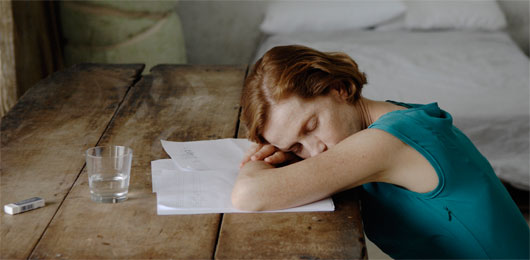 Isabelle Huppert has developed quite a close working relationship with director Benoit Jacquot, with Villa Amalia marking their fifth collaboration. In their latest movie together, Huppert plays musician Ann, whose world is turned upside-down when she sees her husband kissing another woman. With barely any hesitation she decides to leave him, and her whole life, behind, determined to find herself by becoming someone new.
Isabelle Huppert has developed quite a close working relationship with director Benoit Jacquot, with Villa Amalia marking their fifth collaboration. In their latest movie together, Huppert plays musician Ann, whose world is turned upside-down when she sees her husband kissing another woman. With barely any hesitation she decides to leave him, and her whole life, behind, determined to find herself by becoming someone new.
With the help of a man from her distant past, Georges (Anglade), she sets off on journey that eventually takes her to Italy and a secluded villa on an island, where she tests her boundaries, such as finding a female lover, and attempts to build a new life.
Villa Amalia is a very, well, French film, in that it tends to work better on an intellectual level than it does as cinematic storytelling. It is a film of moments, often unexplained and which are sometimes even a mystery to those involved, exploring how in life we often do things that arent fully rational and baggaged with a completely sensible explanation. It also spends a lot of time looking at solitude, which is a tough thing to deal with in cinema, and which while intriguing does mean Villa Amalia has a tendency towards lacking impetus, especially as its lack of desire to explain anything means its sometimes difficult to find access as a viewer beyond the intellectual and into the characters. You have to supply the meaning yourself, which works in context but does make it a slightly frustrating experience, as the film flirts between asking the viewer to engage and disappearing into a solipsism that shuts the audience out.
And I know this may make me sound like a philistine, but it doesnt help either that Villa Amalia is full of French film-speak. You know what I mean, where people dont talk like real human beings and instead spout dialogue thats too literary, and uses too many words that dont actually say all that much.
Thankfully the film does have one real saving grace, which is Huppert. Shes called on to carry the film completely, particularly as much of it is about her characters solitude. She is magnetic, constantly intriguing the audience with whats going on behind her eyes. Shes so good that its difficult not to wish the movie itself offered more, especially as no matter how much she invites the viewer in, the movie itself seems equally intent on being oblique and shutting people out.
While not a bad movie it is a bit frustrating. The way it layers together moments, uses music that often seems dissonant to whats going on (but may better express the characters mental state than outward appearances apply), and tries explore how life doesnt come with simple explanations and logic, is all very interesting intellectually, but it does make it a rather isolating and uninvolving experience as a viewer.
Overall Verdict: Huppert is wonderful, but the film itself, while intriguing, is often so interested in the formal and the intellectual that it forgets to fully involve the viewer.
Reviewer: Tim Isaac